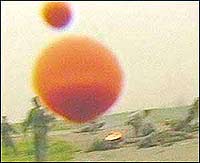
So as I mentioned on the message board, I watched the documentary Iraq: The Cameraman's Story on BBC4 last night.
Half of the film was made by Fred Scott, with whom I travelled into Northern Iraq and spent a month in Arbil just before the start of the war. The interminable bus journey from Turkey, the Arbil Tower Hotel....all the experiences I described in the early days of the blog are in the documentary.
The film focuses on the "friendly fire" incident in which Fred, John Simpson and the rest of the team got caught up and in which their translator was killed. I hadn't seen much of the footage and it really upset me. By the end I was crying on the sofa.
Not only did it bring back all the memories of my accident -- the confusion, the face down in the dirt, the frantic shouts in Kurdish -- but it also reminded me of when I heard that Fred and his team had been hit.
It was the morning after I got back to the UK.
I was still groggy after the anaesthetic I'd had the day before when I went down to the operating theatre so that the surgeon could take a look at my injuries (and decide that my foot couldn't be salvaged.) I switched on the TV and the first thing I saw on News 24 was a "Breaking News" strapline and a scrolling headline reporting what had happened to them.
I felt my guts sink through the floor. My ears felt like they were ringing. I couldn't concentrate. I just couldn't believe what I was reading. Another accident in Northern Iraq, just days after mine? What were the chances of that happening? I was convinced the whole team had been wiped out. I immediately got on the phone and tried to find out what had happened. Before long, John was broadcasting live, describing what he called "a scene from hell."
One of my bosses has since told me that after that week, in which ITN's Gaby Rado died and the two BBC teams in Northern Iraq were hit, he was afraid to answer the phone. Every time it rang it seemed to be news of more journalists killed and injured.
It was a terrible week for journalism.
And with Jamie spending the weekend here in London, on her way to Baghdad, much of the talk has been of why we do what we do. Why do we go to these god-forsaken places, putting ourselves in danger -- and more to the point, why do we do it willingly? Is it sheer egotism? A misplaced sense of invulnerability? A death-wish?
Why do journalists leave their husbands and wives, their partners and young children and get on planes time and time again, not knowing what lies ahead and whether they'll get back safely?
I don't fully subscribe to this notion that it's all about bearing witness to the truth. There are untold stories all around, not just in hostile environments. So why do we do it, why?
We do it because we mistakenly believe, as Kaveh said, that "war is great." We kid ourselves that it is only in dangerous places that we can feel truly alive.
Except that war isn't great. It's shit and our friends get killed.
Discuss "Beyond Northern Iraq"

0 Comments:
Post a Comment
<< Home